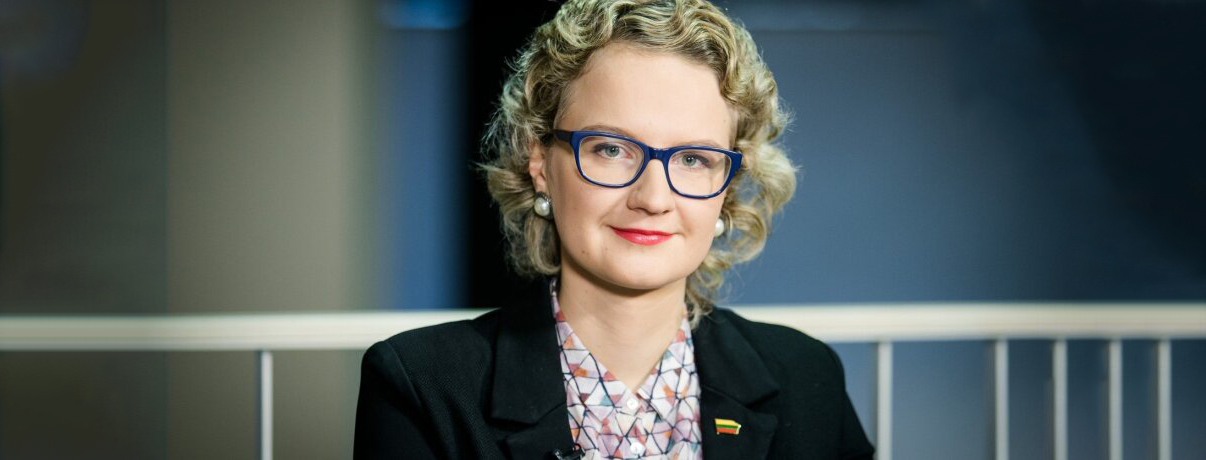Don’t Be Afraid of Change, Be a Part of It: A Discussion on Gender Equality With Lithuania’s Aušrinė Armonaitė

On International Women’s Day, the International Republican Institute (IRI) is shining a light on the milestones Lithuania marked last year with the election of its historic women-led government. Below is an interview with the country’s Minister of Economy and Innovation Aušrinė Armonaitė, who is one of seven female ministers in Lithuania’s parliament, known as the Seimas. In her discussion with IRI, Armonaitė shares the value of women’s political participation, the headway Lithuania has made in gender equality and the work left to be done.
What is the importance of women’s participation in politics? What do you strive for in politics and policies related to women?
It’s crucial to involve more women in politics and other areas of decision-making. Women have different experiences and their point of view contributes to more diverse decisions. We need to ensure diversity because only then is society best represented. That’s why we need as many people coming from different backgrounds as possible: women, men, people of different ages, the LGBT+ community, people with various occupations. Therefore, I’m excited that half of the experts in our new government are women.
However, positive trends in political representation do not make gender inequality disappear. The gender pay gap in the European Union (EU) is over 14 percent and only slightly less wide in Lithuania, at 12.4 percent. The reasons behind this are well-known: women are underrepresented in high-paying sectors, the bulk of unpaid care work falls mainly on women’s shoulders. Such trends are only exacerbated by the global pandemic.
On the other hand, we could also use the pandemic as an opportunity. We know that gender equality has strong, positive impacts on GDP per capita which grow over time. EIGE projects that reducing the gender pay gap in STEM would contribute to an increase in EU GDP per capita by 2.2 to 3.0 percent in 2050. I’m glad that, according to Eurostat, Lithuania has the highest proportion of women scientists among the EU Member states. We need to keep this direction, and together with bolstering innovations and R&D, we must create conditions for women to choose high-tech occupations and lead in science. Initiatives such as Women Go Tech are very helpful in achieving that. This opportunity cannot be ignored if we are to reinvigorate our economies in the wake of the pandemic. And that’s one of my top priorities for Lithuania.
What is still needed to break the glass ceiling in politics once and for all? Will the new generation trigger the change?
We can see an enormous change brought by the new generation. Various NGOs have done a great job and brought this question into the public discourse. More and more influential people discuss this issue, too. They initiate discussions on social media and attract the mass media’s attention. That’s the first step towards changing stereotypes that fuel gender inequality.
But the growing awareness of the issue must be accompanied by action: both the public sector and businesses should set diversity hiring and promoting goals or adopt pay transparency policies. Such practises are adopted in countries that are global leaders in gender equality, and they are good practices to follow.
Also, we need to increase women representation in the mass media. In Lithuania, we have great initiatives, such as the recent platform “Profesionales.lt”, providing contacts of women professionals to journalists or event planners, making women entrepreneurs more known and setting an encouraging example to others.
Finally, we must fight the persistent stereotypes, too. Besides proposing policies related to gender issues, such as amendments to the Law on Equal Opportunities, we must take a holistic approach and include this narrative in other policies as well. Above all, in education. To expect societal change, we must teach our children about tolerance and stereotypes at school from the earliest possible moment.
Change is never easy. But women can be a powerful force for change building more inclusive societies, more robust and vibrant economies. The important thing is not to be afraid of the change. Be a part of it.
Top